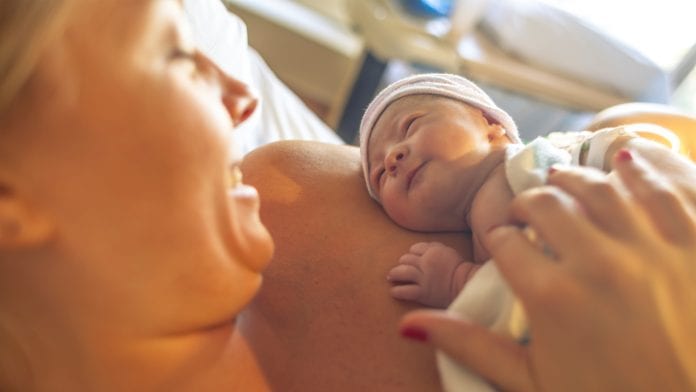
A new survey has highlighted an increased need for mother and baby skin-on-skin contact during COVID-19, as many newborns are being put at risk of death by being separated from their mother.
New research has suggested that ‘Kangaroo Mother Care’, a life-saving technique involving early, prolonged skin-to-skin contact for preterm babies and exclusive breastfeeding, is vital for the survival of newborns during the COVID-19 pandemic.
In a worldwide survey, two-thirds of 1,120 healthcare workers said they would separate mothers and babies with a positive or unknown COVID-19 status, however, implementing the Kangaroo care method could save up to 125,000 newborn lives. This represents a 65x decreased risk of newborn death compared to the risk of newborn deaths from COVID-19.
Newborns are the most vulnerable citizens worldwide, with 2.5 million dying within 28 days of their birthday each year, more than 80% of which are of low birth weight. Despite this, small and sick newborns have not been considered in global assessments of pandemic-related disruptions.
The study, which is the first published survey to focus on small and sick newborns during the pandemic, was conducted by a global collaboration, facilitated by the London School of Hygiene & Tropical Medicine (LSHTM), St. John’s Medical College, Bangalore, India, and NEST360, and has been published in BMJ Global Health.
Risk of death for newborns
The survey suggests that the COVID-19 pandemic is affecting the quality of care given to small and sick newborn babies in all regions of the world and threatening implementation of life-saving interventions. The findings underscore the need for decision-makers and providers, particularly in low- and middle-income countries (LMICs), to protect and strengthen care for small and sick newborns during the pandemic.
More than 85% of respondents reported ‘fearing for their own health’, with PPE shortages, stress and safety concerns among the issues reported. In some hospitals, they reported vital resources including staff and equipment, notably oxygen supplies, being moved from newborn wards to COVID-19 care wards.
The most crucial finding was that two-thirds of health workers wouldn’t support the Kangaroo Mother Care method, instead, separating newborns from their mothers which puts the babies at increased risk of death.
Professor Suman P N Rao, from St. John’s Medical College, Bangalore, India, and a lead author on the study, said: “Kangaroo Mother Care (KMC) is one of our most cost-effective ways to protect small and sick newborns. Now it is more critical than ever to ensure mothers are supported to do KMC and that healthcare professionals feel safe and comfortable to support in the delivery.
“Our data show huge promise for many lives saved with universal KMC, so it’s vital that we use this opportunity to strengthen care now and build back better after the pandemic.”
The importance of this finding is reinforced by new research published in EClinicalMedicine, conducted by a global collaboration led by the World Health Organization with LSHTM and the University of California San Francisco (UCSF).
This research undertook analyses for 127 countries, estimating that if universal coverage of KMC was achieved, more than 125,000 newborn lives would be saved compared to the risk of newborns catching COVID-19 and dying, which would result in fewer than 2,000 deaths.
Healthcare workers cited a number of reasons for separating mothers and babies, including fear for their own health, shortages in eye-shields and quality face masks, as well as lack of COVID-19 testing.
Dr Queen Dube, co-author, Paediatrician and Director of Health Services, Malawi, said: “COVID-19 has had a devastating toll on our small and sick newborns across Africa. In Malawi we’ve been seeing this on the front-line – overstretched stressed staff, equipment, and oxygen supplies being moved to other areas managing COVID-19 patients. It’s heart-breaking yet we can do more to protect mothers and babies. We are seeing excellent innovations daily. Through clever engineering and agile turnarounds, NEST360 in Malawi was able to develop and make PPE. Now is the time to use learnings to strengthen health systems and radically improve care for 15 million newborns born too soon worldwide every year.”
Infection prevention
Infection prevention in practice is key to helping healthcare workers provide optimal healthcare for mothers and babies.
Guidelines for newborn care in the pandemic may be missing, unknown, unclear, or potentially mistrusted and urgent research is also required regarding mitigation strategies to promote the health and mental wellbeing of the frontline healthcare workers.
Professor Joy Lawn from LSHTM, as well as NEST360, and senior author said: “Our findings show how COVID-19 is disrupting care for small and sick newborns across the globe. Newborns can die in minutes and are the most vulnerable, even more so in a pandemic. Policymakers can and must protect newborn health services, ensuring evidence-based practices for all, including women who are SARS-CoV-2-positive.
“Healthcare workers around the world are doing outstanding work despite challenging circumstances, and vaccines to protect them are urgently required. Data and rapid implementation research must be part of driving action. We could see reversals for hard-earned gains in newborn survival if we don’t act now.”










